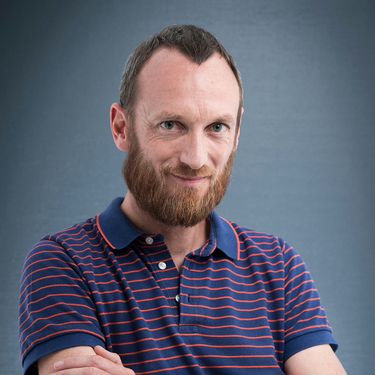Zero-emission flight is not the “pipedream” that most people may think, according to Glenn Llewellyn, General Manager, Electrification at Airbus. And Glenn would know: he has been working on electric and hybrid-electric technologies for aircraft since 2014. Today, Glenn leads Airbus teams working on electric-powered flight demonstrators and eVTOL demonstrators, including Vahana, CityAirbus and E-Fan. His latest project E-Fan X—a complex hybrid-electric aircraft demonstrator—is the next step in Airbus’ electrification journey. When the demonstrator embarks on its first flight in 2021, the E-Fan X will be a giant leap towards making zero-emission flight a reality by the mid-2030s.
Aviation connects people, cultures and businesses. It enables mutual understanding and is considered a contributor to world peace. The problem is not aviation. The problem is carbon.
Glenn Llewellyn, Airbus General Manager, Electrification
5 questions with Glenn Llewellyn
Q. In your opinion, what is the biggest challenge facing cities today?
I’m a huge believer in the power of diverse thought. The healthy conflict that can exist between people approaching a topic from different perspectives generates creative magic. I think one of the biggest challenges of future cities is to enable the meeting of these diverse thoughts inside cities and between different cities. This means ensuring sufficiently fluid interconnections using zero-emission technology. We’re just starting this journey. The challenge is, of course, a technical one, especially for larger commercial aircraft. But managing and regulating urban flight will also be a significant challenge.
Q. How can cities help to create a sustainable future for our planet?
As more and more of the world’s population lives in cities, it’s important that cities take the lead working with industry and regulators to bring zero-emission technology to reality. There will be challenges as for any disruptive transition, and it will only be successful through public-private partnerships and alliances.
Airbus is already working together with numerous cities to further develop our vision of zero-emission urban air mobility.
Q. You’re currently working on the E-Fan X project. What do you hope to achieve with this project?
We aim to prove that hybrid-electric aircraft architecture is a realistic goal in providing the benefits we expect in the medium term. The E-Fan X will test a 2MW electric motor on board a regional transport aircraft. That’s more than 30 times greater than its predecessor, the E-Fan! Nothing like this has ever flown before. We’re currently finalising the design. We expect to start testing on the ground later this year. As a company, we have the ambition to make zero-emission commercial aviation possible. E-Fan X is one of the stepping stones to that ambition.
Q. Aviation is perceived as a key contributor to pollution. And the “anti-air travel movement” is starting to gain global buzz. How do you hope electrification and projects like E-Fan X will help to change this perception?
Aviation connects people, cultures and businesses. It enables mutual understanding and is considered a contributor to world peace. The problem is not aviation. The problem is carbon. At Airbus, we’re investing to significantly reduce the CO2 emissions of our products because we see a clear societal benefit to aviation. At the same time, we understand the urgency to reduce CO2 emissions. It’s already possible to fly with zero local emissions: we’ve shown that with demonstrators like Vahana and E-Fan.
In the medium term, we believe electrification will enable lower pricing and greater accessibility to more sustainable forms of flight. In addition to electric propulsion, we’re also looking at other options like hydrogen and sustainable fuels. We believe these technologies can complement each other.
Q. How do you see commercial aviation in 10 years’ time? Will we have electric-powered commercial aircraft? If not, what will have been achieved by then?
We have a very clear research target to make the technology available for a 100-seat hybrid-electric aircraft available by the 2030s.

Glenn Llewellyn is a speaker at the Urban Futures Global Conference, from May 22 to 24 in Oslo, Norway. He will speak about the evolution of electric and hybrid-electric flight, including commercial aircraft. See the UFGC speaker programme here.